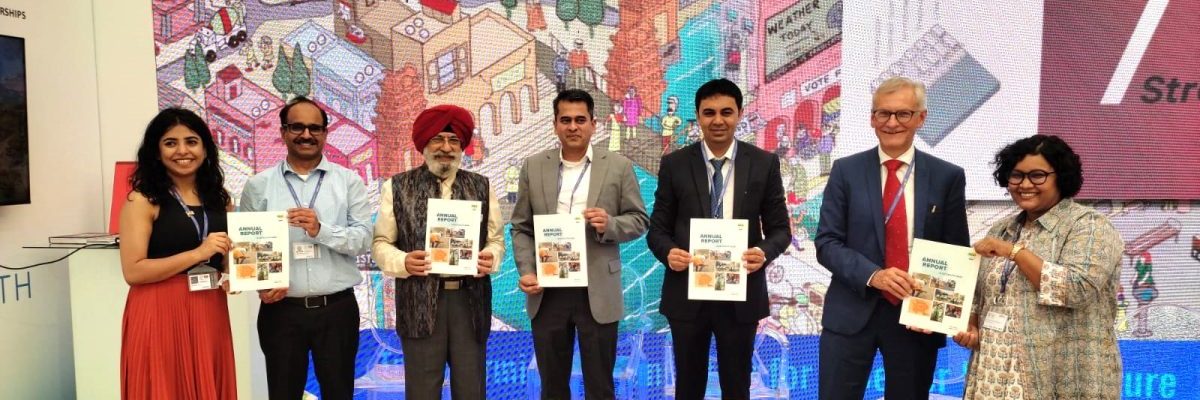ICLEI South Asia Showcases Work on Climate Resilience, Heat Solutions at WUF11

ICLEI South Asia marked its presence at the 11th World Urban Forum (WUF11) by participating in key sessions and showcasing its impactful work in sustainable urban development. The focus of the five-day event, co-organised from 26-30 June in Katowice, Poland, by UN-Habitat, Poland’s Ministry of Development Funds and Regional Policy and the Municipal Office of Katowice, was on identifying pathways toward developing sharable solutions for building a better urban future.
Mr. Emani Kumar, Deputy Secretary-General, ICLEI, and Executive Director, ICLEI South Asia, gave presentations on ICLEI South Asia’s work in sessions that were attended by senior representatives from governments, civil society and the private sector from across the globe.
A key session was on “CapaCITIES – Transforming Our Cities for a Climate Resilient Future”, jointly organised by the National Institute for Urban Affairs (NIUA) and the CapaCITIES project. The NIUA is the knowledge partner in the CapaCITIES project, which is funded by the Swiss Agency for Development and Cooperation and implemented by ICLEI South Asia, South Pole, and econcept. The session focused on climate planning and implementation experiences from the CapaCITIES project cities and other cities in India. Senior representatives from agencies at the national, sub-national and local levels discussed emerging policy paradigms and innovative city actions. The support from Switzerland to accelerate climate action in India was also showcased.
Hon’ble Mayor of Rajkot Dr Pradip Dav presented the work done in his city under the CapaCITIES project, including initiatives for increasing green cover, electric mobility and groundwater recharge systems, to name a few.
Mr. Kumar spoke about the climate action plans and strategies that have been developed under the project, as well as the Phase 1 achievements and the initiatives identified for preparing bankability reports, technical assistance and innovative financing models. He also launched the Annual Report of ICLEI South Asia for the financial year 2020-2021. Get access to additional session details here.
During a meeting with Ms Maimunah Sharif, Executive Director, UN-Habitat, Mr Kumar discussed global urban issues including the Malaysian Green Cities Action Plan, and how ICLEI could support cities in building climate resilience and mitigation strategies. Dr Dav informed her about the climate-resilient initiatives being taken in Rajkot and their vision of sustainable development. Ms Sharif invited ICLEI as well as the Hon’ble Mayor to join SDG Cities, a global initiative of UN-Habitat for accelerating sustainable development of cities and improve well-being for all.
At an interesting ‘City Works Training’ session, organised by the Federal Ministry for Economic Cooperation and Development, Germany, Mr. Kumar presented the Voluntary Local Review reports prepared for Dhulikhel in Nepal and Singra in Bangladesh under the Climate Development Knowledge Network programme. He was also a panellist in a session on ‘Beating the Heat: Unleashing Sustainable Urban Cooling Solutions’, jointly organised by NIUA and the United Nations Environment Programme (UNEP), in which comprehensive approaches to combat extreme heat with sustainable solutions were discussed. ICLEI South Asia is the technical partner to UNEP in a project on developing an urban cooling plan for Rajkot, the first city in India to be chosen by UNEP for the purpose. A customised methodology is being developed for the city, in partnership with the UNEP-led Cool Coalition, which plans to coordinate and integrate municipality-led action on extreme heat and sustainable cooling. The experience is helping ICLEI South Asia to understand the cooling requirements and what needs to be done, including the governance mechanisms.
At another session titled ‘Sustainable Urban Transformation of Cities through Innovative Approaches’, organised by The Energy and Resources Institute, Mr. Kumar reflected upon the need for engaging with cities to support urban freight planning. ICLEI South Asia is implementing the EcoLogistics project, supported by the German Federal Ministry for the Environment, Nature Conservation and Nuclear Safety through the International Climate Initiative, in three Indian cities, Kochi, Panaji and Shimla. The project focuses on capacitating governmental and non-governmental actors to build strategies and policies to promote low-carbon and more sustainable urban freight through local action and national support. Mr Kumar shared the experience of implementing the ongoing project, adding that there is a need to improve the situation in terms of financing to support the clean technology shift, and to work towards effecting a transition from planning on paper to implementing on the ground.